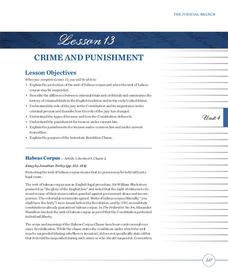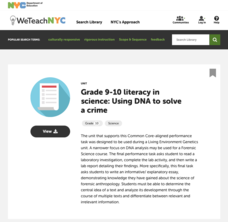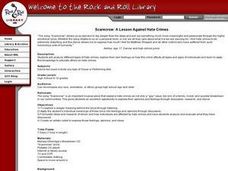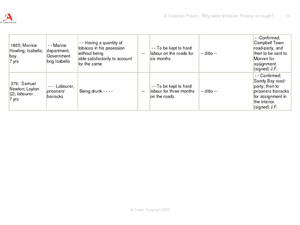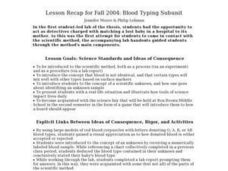Manitoba Education and Early Childhood Learning
Forensic Sciences: A Crime Scene Investigation Unit
Mr. Bergman has been murdered and we need you to solve the crime! The cross-curricular unit covers 11 different types of forensic science and includes 17 activities. Scholars perform blood type analysis, blood spatter analysis, height...
Judicial Learning Center
Types of Court Cases
How can one court acquit someone of a crime, while another convicts the person of the same one? It's all because of the differences between civil and criminal trials. An informative resource provides scholars in the field of criminology...
ConnectED
Crime Scene Investigation
How exactly does a crime scene investigation work? The resource, a unit on criminology, covers everything from the deductive reasoning skills needed for detectives to DNA fingerprinting, all the way to how to gather evidence and bring...
Curated OER
Blood Typing Investigation
Students role-play a scenario in which a car crash patient is inadvertently given the wrong blood type during a transfusion. They perform blood typing and explore the genetics behind ABO and RH blood types using simulated blood.
Heritage Foundation
Crime and Punishment
You wouldn't give someone a 10-day timeout for eating a piece of candy. The US government, too, does not believe in unreasonable punishment. A variety of exercises exploring the clauses of the US Constitution prompts class members to...
Curated OER
Committing Crime or Just Having Fun?
Students breakdown different types of youth crime/gangs. Students evaluate the power of peer pressure. Students identify and offer advice for dealing with peer pressure. Students encounter the theory of phenomena.
New York City Department of Education
Grade 9-10 Literacy in Science: Using DNA to Solve a Crime
Scholars become detectives and use science to solve a crime! A complete unit introduces DNA and includes hands-on activities that have learners model DNA and extract it from different food types. A culminating activity challenges...
Curated OER
Fiber Identification
Lab sheets for three different crime scene investigation activities are tucked into this resource. In the first activity, inquisitors examine a variety of fibers, including the fiber found at "the crime scene," under ultraviolet light....
Curated OER
Crime Scene Investigation - Biology Teaching Thesis
Students explore the different blood types, and are introduced to new knowledge through a crime scene simulated activity. They explore the genetics of blood types, and are introduced to immunology/diseases.
Curated OER
Lessons in Legal Ethics: Crime and the Media
High schoolers examine a variety of ethical issues that arise in criminal cases. They get into groups, and perform a case study of a real situation in which many of these ethical issues came up. All of the worksheets needed to...
Curated OER
Cyber-crime
Students discuss what types of Internet activity are or should be considered criminal, examine how criminal prohibitions against certain types of Internet activity are best implemented in law, determine whether computer crimes are unique...
Curated OER
White Collar Crime
Learners discuss difference between crimes of deceit versus crimes of violence, define white-collar crime, and examine far reach of white collar crime laws. Students then analyze what differences exist between rationales for punishing...
Judicial Learning Center
Understanding the Types of Cases
Most young scholars are aware of the criminal courts system, but the United States Constitution allows for a much broader role. What other roles do courts play in settling other questions? A case study and WebQuest-style activities...
Curated OER
Scarecrow: A Lesson Against Hate Crimes
Students analyze and discuss different types of hate crimes. They listen to and discuss the background behind the song, "Scarecrow" by Melissa Etheridge. They research a hate crime and imagine how the victims must have felt. Finally they...
Curated OER
A Victorian Prison
Prisons in Victorian England were miserable places, designed to deter people from committing crimes. To understand why these prisons were so tough, young historians review documents and pictures from Coldbath Fields prison. After...
Curated OER
Who Done It?
Pick and choose which activities to include in this crime scene investigation. Junior detectives can examine fingerprints, DNA, blood samples, or bone structure. The plan suggests you have teams solve a mystery, but it does not give you...
Curated OER
Hairy Evidence! Hair Identification
Provide a mystery hair and a set of reference hair samples for middle school investigators to place on a slide and examine under a microscope. Materials and procedures are detailed on the first page, while a data table for drawing what...
Curated OER
Blood Typing Subunit
Students play the role of science detectives in an activity used to introduce the scientific method and the concept that blood is not identical and is identified by surface markers. Students must identify an unknown sample of "blood" by...
Curated OER
Problem Based Learning
Students increase problem solving skills. They research computer-related crimes, classifying them into the types of crimes. Students create a crime report. They present a presentation to the class.
Curated OER
The Ugly Truth about Hate
Students investigate examples of hate crimes and their causes by participating in a round-table discussion. They also write a personal essay describing their personal views on the subject and describing a plan for putting their views...
Curated OER
Hanging the Sheriff, The Story of Henry Plummer
Students study who Henry Plummer was in relation to the history of Bannack, Montana. They examine his role as sheriff, what types of crime he dealt with and participate in a mock trial to determine if his hanging was justified.
Curated OER
Defining Crime and Deviance
In this crime and deviance activity, students answer questions and provide examples of various types of deviant and criminal behavior and compare it from culture to culture.
Curated OER
Mission Possible
Students, in teams, solve a crime using forensic lab techniques. They apply lab techniques to a real life situation using a crime scenario that takes place on campus. Sample activities include Blood, Fiber, and Hair Lab.
Judicial Learning Center
State Courts vs. Federal Courts
Popular culture often portrays the Feds as the most fearsome of law enforcement agencies. Yet, someone charged with a crime is considerably more likely to end up in a state court. The lesson, one of six covering the Organization of the...






